 The logarithm of a quotient is equal to the logarithm of the dividend minus the logarithm of the divisor. The logarithm of a quotient is equal to the logarithm of the dividend minus the logarithm of the divisor.  College Algebra - Page 38by Ernest Brown Skinner - 1917 - 263 pagesFull view College Algebra - Page 38by Ernest Brown Skinner - 1917 - 263 pagesFull view - About this book
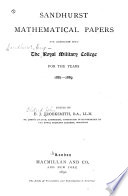 | Royal Military College, Sandhurst - Mathematics - 1890 - 144 pages
...Prove that, if a ft are the roots of the equation ax* + (a + b}x + b = o, . /3 a . b 10. Prove that the logarithm of a quotient is equal to the logarithm...of the dividend diminished by the logarithm of the divisor. Given loge 2 = '69314718, log,. 3 = 1-09861229 ; find the logarithm to the base e of • (D... | |
 | William Findlay Shunk - Railroad engineering - 1890 - 360 pages
...The logarithm of the product of twp numbers is equal to tb* sum of the logarithms of the numbers. « The logarithm of a quotient is equal to the logarithm of the dividend diminished by that of the divisor. The logarithm of any power of a number is equal to the logarithm of the number... | |
 | William Joseph Hussey - Logarithms - 1891 - 172 pages
...use are as follows: The logarithm of a product is equal to the sum of the logarithms of its factors: The logarithm of a quotient is equal to the logarithm of the dividend. minus the logarithm of the divisor. The logarithm of any power of a number is equal to the logarithm... | |
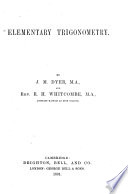 | John Maximilian Dyer - Plane trigonometry - 1891 - 306 pages
...log. n + log. p. In the same way the theorem can be extended to any number of factors. 106. Theorem 2. The logarithm of a quotient is equal to the logarithm of the numerator minus the logarithm of the denominator. щ Let — be the quotient, a the base ; we have... | |
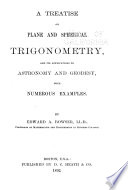 | Edward Albert Bowser - Trigonometry - 1892 - 392 pages
...+ logan + \ogap, and so on for any number of factors. Thus, log 60 = log (3 x 4 x 5), •log5. (5) The logarithm of a quotient is equal to the logarithm of the dividend minus the logarithm of the divisor. For let a; = logam, and y = \ogan. .: m = a*, and n = a*. — =... | |
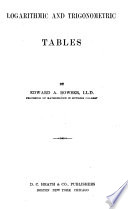 | Edward Albert Bowser - Logarithms - 1895 - 124 pages
...use are as follows : The logarithm of a product is equal to the sum of the logarithms of its factors. The logarithm of a quotient is equal to the logarithm of the dividend minus the logarithm of the divisor. The logarithm of any power of a number is equal to the logarithm... | |
 | Edward Albert Bowser - Logarithms - 1908 - 128 pages
...use are as follows : The logarithm of a product is equal to the sum of the logarithms of its factors. The logarithm of a quotient is equal to the logarithm of the dividend minus the logarithm of the divisor. The logarithm of any power of a number is equal to the logarithm... | |
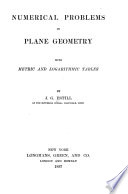 | Joe Garner Estill - Geometry - 1896 - 168 pages
...as follows : I. The logarithm of a product is equal to the sum of the logarithms of its factors. II. The logarithm of a quotient is equal to the logarithm of the dividend minus the logarithm of the divisor. III. The logarithm of any power of a number is equal to the logarithm... | |
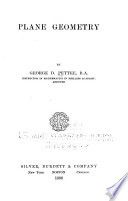 | George D. Pettee - Geometry, Modern - 1896 - 272 pages
...logarithms: 11. The logarithm of a product is equal to the sum of the logarithms of all its factors. 12. The logarithm of a quotient is equal to the logarithm of the dividend minus the logarithm of the divisor. 13. The logarithm of the power of a quantity is equal to the logarithm... | |
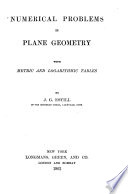 | Joe Garner Estill - 1896 - 186 pages
...as follows : I. The logarithm of a product is equal to the sum of the logarithms of its factors. II. The logarithm of a quotient is equal to the logarithm of the dividend minus the logarithm of the divisor. III. The logarithm of any power of a number is equal to the logarithm... | |
| |